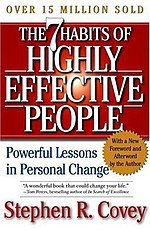By Christine Whelan

Yesterday, self-help author and business leader Stephen Covey died at 79. Author of?The 7 Habits of Highly Effective People?(and many other bestsellers), Covey will be remembered as an inspirational teacher and leader. Tonight I appeared on?WSJ.com LIVE to discuss his legacy.
Stephen Covey, a business management professor, had studied effective styles of leadership and organization for more than two decades when he wrote The 7 Habits of Highly Effective People?in 1989. What made this book such a runaway success?selling more than fifteen million copies in thirty-eight languages?is that it?s not just a business book, it?s a life-improvement guide that synthesizes some of the greatest virtue-based ideas of American self-help.
Covey, who studied 250 years of success literature before embarking on his book, borrows from the great masters of self-help. Covey argues that before you can achieve greatness within business, family, or your community, you must first find your inner strength and character. While other guides may jump right to quick-fix approaches, Covey says that true change requires a focus on the ?character ethic? not the ?personality ethic.? Character is primary, personality is secondary?and simply to understand that will be a paradigm shift, a new approach or life map, for many readers. ?The way we see the problem is the problem,? writes Covey. Rather than superficial changes, he asks his readers to take a ?principle-centered, character-based, ?inside-out? approach to personal and interpersonal effectiveness.? And to do this takes self-control and commitment.
Following this outline, the rest of the book is divided into three sections?personal victories, public victories, and renewal. Habits 1?3 are personal developments toward independence?becoming a proactive person, beginning with the end in mind, and putting first things first. Habits 4?6 are part of the quest for interdependence and good relationships with others?thinking in terms of win/win scenarios, seeking first to understand the other person before seeking to be understood yourself and the ability to synergize, or work together successfully in a group. The final step, and the final section, is about sharpening the saw?continually renewing your most valuable asset: you.
Covey tells readers that to get the most out of his book they should use it as a reference and continually return to the text for a refresher. On the first reading, Covey suggests readers engage with the text as if they were going to have to teach the information to someone themselves within the next forty-eight hours, another good active reading strategy. It?s a rousing introduction?and one that inspires readers to make commitments to personal change?but Covey doesn?t sugarcoat his message: It?s not about lip service to self-improvement, it?s about examining your principles and embarking on a drastic personal overhaul.
For the best of Covey?s work remixed for your day-to-day life, check out?Generation WTF. Hundreds of young-adults tested his advice and updated it with real-life examples especially for 18-25 year olds today.
God bless you, Stephen Covey. Your work has touched many lives and your purpose has been one of service and inspiration. You will be missed.
Dr. Christine B. Whelan is a author, speaker and professor. She is one of the foremost experts on the genre of self-help literature and her latest publication is?Generation WTF:?From ?What the %#$@?? to a Wise, Tenacious, and?Fearless?You.
Like this:
Be the first to like this.
Tags: 7 Habits of Highly Effective People, acculturated, Christine Whelan, Generation WTF, self help, Stephen Covey, wsj
Source: http://acculturated.com/2012/07/18/stephen-covey-1932-2012/
walmart black friday sales michelle obama booed at nascar polio cutler amas music awards 2011 music awards 2011
No comments:
Post a Comment
Note: Only a member of this blog may post a comment.